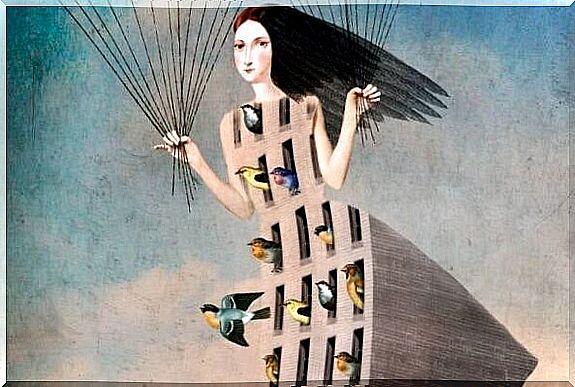Collective Narcissism, A Virus That Is Spreading More And More

Collective narcissism has turned into a virus. We can define it that way because it hurts, is contagious, and spreads easily. Although it does not seem so, this search for exaltation of one group to the detriment of others is a dynamic that has taken place in all eras; only its intensity has changed and peaked at certain moments in history, such as in the days of Nazi Germany.
Narcissism expresses a certain nostalgia for a “superior race”. Although, of course, it doesn’t always relate to a breed. Any group within which there is an element of common identity falls within this concept. We can talk about nations, sports teams or professions.
He manifested himself very visibly in football. Collective narcissism means that some supporters cannot stand the victory of their opponents at all. It also prompts them to perform displays of power with chants, loud noises or strange appearances, in an attempt to intimidate others.
“Narcissism. You couldn’t believe it, eh, that I didn’t have a standing mirror. ”
-David Levithan-
The same is happening with countries and nationalist sentiment. Some are outraged because others don’t like their country. They do not tolerate the slightest criticism and long for their homeland to be admired by all or valued at all times.
Of course, we all want to feel proud of where we were born or the group to which we belong. However, when it reaches other dimensions, it is no longer a healthy feeling. Sooner or later it leads to intolerance and violence.
From group pride to collective narcissism
What would be the difference between national (or group) pride and collective narcissism? Anyone affected by the virus of collective narcissism does not want to feel proud of their group but to demonstrate that they are superior to others. Basically, this marks an insecurity and this is why narcissistic groups seek the re-affirmation of what they think by using the comparison.

In any human feeling, attitude or behavior where you find exaggeration, there is likely to be a neurotic symptom as well. Narcissism is no exception. When it develops at the individual level, we see people appear who like to flaunt themselves and show an image of security that actually makes them suffer.
The same thing happens for groups. Collective narcissism flourishes more easily in those groups who share low self-esteem and great doubts about their own prestige. This is why they seek recognition from others. But not only: in some cases, they also wish their defeat.
A study conducted at the University of Warsaw (Poland) indicated that groups that suffer from collective narcissism are usually made up of individuals who have a strong sense of personal inadequacy. The group is an attempt to compensate for this perception of emptiness.
Manipulation in narcissistic groups
Most commonly, groups that demonstrate collective narcissism elect authoritarian and, more than once, totalitarian leaders. Feeling guided by someone who is invulnerable or, in any case, extremely strong, gives a great sense of security. These leaders normally exploit all of these symptoms and therefore vehemently praise the supposed superiority given to them by this group.

At the University of London, this concept was also studied and led to the idea that these types of groups tend to construct conspiracy theories that would be carried out against them. A common enemy can be that piece that helps to build consistency and unity within these groups. Their narcissism leads them to believe that they are being watched, envied and potentially attacked by others.
Aggression and revenge begin to acquire another meaning in these types of groups. Committing violent acts against those who do not belong to the collective can be seen in a positive light. This happens especially if the aggression is directed against a possible enemy, conspirator or ally of the latter. The same thing happens for revenge: it is no longer seen as an irrational and harmful passion but as a legitimate right, sustained by the apparent need to defend oneself.
Conversely, groups that have a healthy sense of collective pride can lead to constructive results. We are thus witnessing greater cohesion and mutual trust. A union which, to consolidate itself, does not need to denigrate others nor to forget all those who are different. While reasonable pride is a very foundation of democracy, collective narcissism is the basis of fascism and its methods of imposition and control.
Images by Catrin Welz Stein









